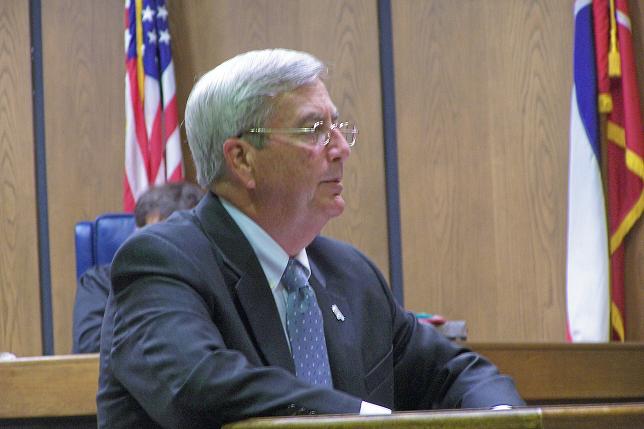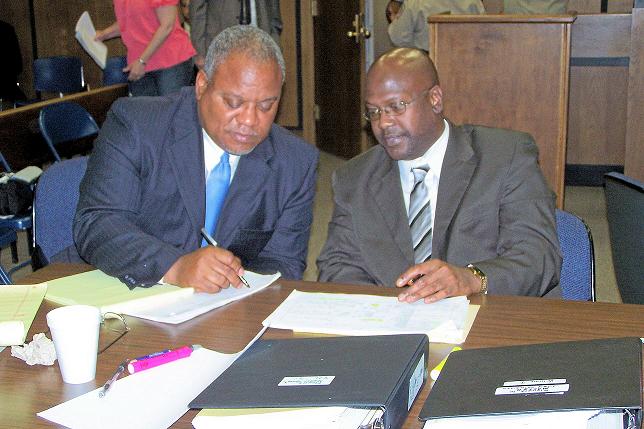WINONA – Now that Judge Joseph H. Loper, Jr., has denied Curtis Giovanni Flowers a new trial, and Flowers is back on Death Row, District Attorney Doug Evans said he doubts there will be a seventh trial.
Flowers’ trials have cost Montgomery County taxpayers well over $300,000.
On June 19, a Montgomery County jury found Flowers guilty of the 1996 execution-style murders of Tardy Furniture store owner, Bertha Tardy and three of her employees, Carmen Rigby, Robert Golden and Derrick “BoBo” Stewart.
The jury also unanimously voted for the death penalty.
While the death penalty warrants an automatic appeal for Flowers, Evans, who has prosecuted the case from the very beginning, said he thinks this was the last trial for Flowers.
“I believe this is probably over at this point,” said Evans. “I think the trial was as clean as it could possibly be and at this point, I don’t see any possible errors.”
Flowers is the third known person to stand trial at least six times for the same crime. In 1989, and after five mistrials, a Harrison County jury found Loretta Pierre guilty of killing her ex-boyfriend’s lover. Pierre is now serving a life- sentence in Mississippi.
In 2005, Oscar Ray Bolin went to trial eight times for the rape and murders of three women. He was convicted and sentenced to death at least six times, with each being overturned on appeal.
Bolin is currently on Death Row in Florida.
Evans said a defendant can go to trial “as many times as it takes.”
“There is no limit,” said Evans. “As long as there is sufficient evidence to try it, it can be tried an unlimited time. But after a certain number [of trials], they usually plead to a lesser charge.”
During Flowers’ sixth trial, his defense attorney, Allison Steiner, made several motions including a Motion to Dismiss on the grounds of Double Jeopardy.
Judge Loper repeatedly denied that motion saying double jeopardy only applies when a defendant has been acquitted of the crime. Flowers has been found guilty four times.
In his first trial, Flowers was tried for the murder of Bertha Tardy and he was convicted.
In his second trial he was tried for the murder of Derrick “BoBo” Stewart, again he was convicted. Those convictions were later overturned because of evidentiary errors.
In his third trial, Flowers was tried for the murders of all four victims and again, he was convicted. That conviction was overturned because the defense said the State sought to keep blacks off the jury.
In June 2010, for Flowers’ sixth trial, and without the jury present, Flowers’ attorneys called for a mistrial because of the limited number of blacks on the jury. Of the 12 members on the jury panel, 11 were white and one was black. Two of the three alternates were white and one was black.
In his response, Judge Loper specifically cited each black juror that was struck and the reasons they were excused.
“They were excused because they knew [Flowers] or his family,” Loper said during the trial. “A lot of people know Mr. Flowers’ parents, his brother and his sisters. And because the Flowers’ family is so endeared by the community, most of the [potential] jurors said they were either related to the defendant and could not be fair or they could not sit in judgment of him. It’s not my fault the jurors are being honest.”
Throughout the trial, Flowers’ defense team also argued that the investigation was “shoddy and disorganized.”
Former Jackson Police Chief Robert Johnson also testified – without the jury present – that he was “troubled” about many things during the initial investigation, including the lack of a lead investigator, the possible contamination of the crime scene and the immediate focus on one suspect.
Flowers’ lead attorney, Ray Charles Carter, grilled several investigators on the case as to why sufficient records and photographs were not kept during the investigation. Everyone questioned, including former Montgomery County Sheriff Bill Thornburg and investigators Wayne Miller, Jack Matthews and John Johnson each said maybe more documentation should have been kept.
Robert Johnson, who has an extensive history with various police departments, law enforcement training and prison systems consulting said even “a rookie is aware of certain procedures that should occur regardless of the [type] of investigation.”
“There are basic procedures or standards in law enforcement,” Johnson said of the need to keep records. “And the old saw is ‘If there is no report, it didn’t happen.'”
Judge Loper later accepted a motion to exclude Johnson’s testimony during the trial.
Evans later said he has always believed the officers did “an excellent job” in investigating the case.
While his attorneys tried to paint Flowers as a model prisoner, who in 13 years, has never caused any problems while incarcerated, Evans later said that Flowers was a suspect in the robbery at Tardy Furniture Store a week prior to the murders, and that while he was a teenager, Flowers shot another man.
The victim, a reported family member, failed to press charges in that incident.
Also in prior trials, several inmates have testified that Flowers admitted to them, while in jail, that he killed the four victims at Tardy Furniture and detailed how he committed the murders.
Evans said the evidence presented in this case has convinced a jury four times that Flowers is guilty of the murders.
“There is no new evidence,” Evans said. “This is the fourth jury that has sentenced him to death and jurors all over the state have found the evidence was there. This was basically the same case that we have presented every time.”
Flowers’ attorneys are expected to appeal to the Mississippi Supreme Court for a seventh trial.




Be the first to comment